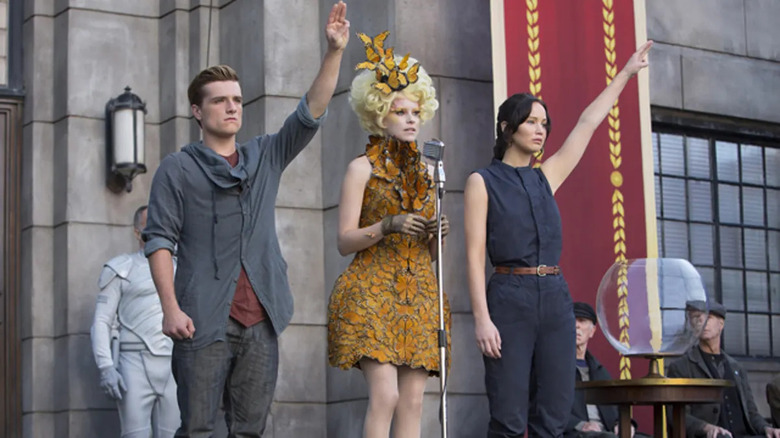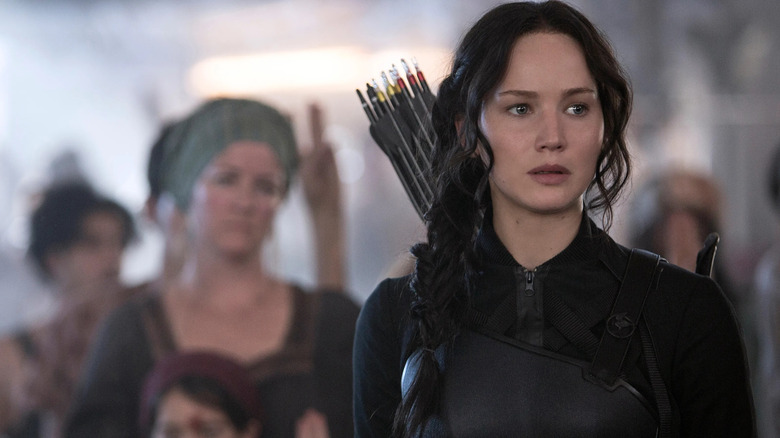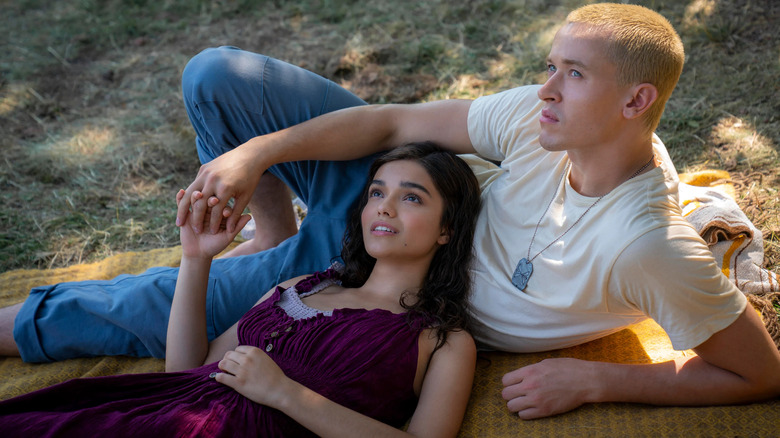That Hunger Games Prequel Is Right On Time — The Original Is More Relevant Than Ever
Lionsgate is having one hell of a 2023. They recently celebrated the theatrical opening of "John Wick 4," which already set a new franchise record at the box office. The studio still has highly anticipated releases like "Are You There God? It's Me, Margaret," "Saw X," and "The Expendables 4," but if you ask me, the biggest title on their slate is "The Hunger Games: The Ballad of Songbirds and Snakes." The film is based once again on Suzanne Collins' popular series of novels and brought back Francis Lawrence, who helmed the latter three films in "The Hunger Games" film series, to direct. "The Hunger Games" films remain the highest-grossing property distributed by Lionsgate, so it's unsurprising they're adapting the prequel story.
But when planning out "The Ballad of Songbirds and Snakes," I doubt anyone at Lionsgate could have predicted a massive resurgence in "The Hunger Games" popularity as Gen-Z viewers discovered the series. On TikTok, the series has been gifted "The Hunger Games Renaissance," which includes millennials sharing stories about their obsession with the franchise a decade ago, and younger viewers noticing the strange and upsetting ways the books and films have unfortunately become even more relevant than ever.
"The Hunger Games" book series debuted in 2008, the year Barack Obama was elected president, and while he was certainly an imperfect leader (but nothing compared to his successor), most people at the time were running on pure, unfiltered optimism. A story like "The Hunger Games," while gripping, was a dystopian fantasy. While we're not at the point of lottery-drawing kids to fight to the death, every new headline feels like America is inching closer toward becoming the districts of Panem under the conservative, wealthy rule of the Capitol.
May the odds be ever in your favor
I'll admit that I was borderline obsessed with "The Hunger Games" book series upon release and was a proud attendee of the midnight previews for every film. I was a college freshman at the time, having already finished the "Harry Potter" series and had no interest in the "Twilight" books outside of dunking on them. "The Hunger Games" hit me at the perfect time, and I became fascinated with this story about a tyrant society, radicalized rebellion among the common folk, and how even the so-called "good guys" could be just as dangerous as the outright fascist rulers.
"The Hunger Games" sparked deep debates about our own way of life, and especially the ways the media contributes to the continued oppression of a majority of American citizens. In the titular Hunger Games, two delegates are sent on behalf of the 12 subservient districts of Panem to fight to the death, with the victor's continued existence treated as both a "gift" from the Capitol and a reminder that they could take us all out at any time if they felt like it. Once more, the spectacle of the games is treated like sports entertainment for the wealthy elites, while the rest of the districts are forced to look on in horror. The games are a tool of power, ensuring the citizens remain hopeless because a weakened enemy is less likely to attack.
That is, unless you're in Districts 1, 2, and 4 for which Career Tributes — people who have spent their entire lives training for the games — view participation as a massive honor. Think of them like Elon Musk reply guys — constantly working against their own best interest because they foolishly believe the Capitol will never turn on them.
The power of Netflix
"The Hunger Games" film series was added to Netflix on March 1, leaving the platform on March 30 as part of Lionsgate's promotional plan. During a recent interview with The Wrap, Lionsgate motion picture group chairman Joe Drake said the goal is to not only put the films back on Netflix, but motivate audiences to revisit the books. As he said in the interview, the last time "The Hunger Games" films were available on Netflix, the books wound up back on the bestseller list, and sales for "The Ballad of Songbirds and Snakes" rose by "40 to 50 percent." This is a repeat of the book-first strategy for the original films, now emphasized with the additional power of streaming.
Drake also admitted that the new "Renaissance" was a happy surprise: " ... While it started with people who grew up reading and watching the 'Hunger Games,' we're also seeing it being embraced by a whole new audience of teens who are discovering the films and books." Now, I'm unsure how much time Drake spends on TikTok, but the type of viral content making the rounds is a lot less "OMG Team Peeta!" which was a huge part of the marketing for the original films, and a lot more "Let's talk about how Finnick Odair was forced into sex trafficking after winning the games at the age of 14."
For the entire month that "The Hunger Games" films were available on Netflix, the titles were constantly trending. Prime Video even started prioritizing promoting "The Starving Games," the mockbuster parody film currently boasting a whopping 0% on Rotten Tomatoes. It wouldn't be surprising if "The Hunger Games" films stayed off streaming platforms until closer to the release of "The Ballad of Songbirds and Snakes," giving fans plenty of time to read the books and develop some quality FOMO in the interim.
The importance of a prequel
"The Ballad of Songbirds and Snakes" is also coming at a perfect time because there has been a massive increase in people looking into America's disturbing history — especially now that conservatives are trying their damnedest to sanitize public education by banning texts that provide *checks notes* factually accurate depictions of racism and other systemic forms of oppression. The story of "The Hunger Games" centers on the 74th annual games, meaning the nation of Panem and the Capitol have a rich, disturbing history of their own to dissect.
Suzanne Collins' novel takes place around the 10th annual Hunger Games, where an 18-year-old Coriolanus Snow is chosen to mentor the tribute from District 12, Lucy Gray Baird. This story provides insight into how Snow will someday become the tyrannical President of the Capitol by the time Katniss Everdeen volunteers for the 74th annual games (and unintentionally sparks a revolution), and serves as a reminder that some people are conditioned into their villainy.
This feels extremely relevant, especially when considering the presidential regime America is still recovering from, and still navigating the constant threat that it could very easily happen again — but worse. Let's make something abundantly clear; the twice-impeached disgraced former president Donald Trump did not invent racism, homophobia, misogyny, ableism, transphobia, antisemitism, or a desire for fascism — but his rise to power emboldened those who believe in these oppressive systems. Similarly, President Snow did not invent The Hunger Games, but he did find a way to make an already cruel system work to his benefit.
"The Hunger Games" is also a stark reflection of our own reality, where tributes from marginalized districts were viewed as "less valuable" by the Capitol citizens, and often denied life-saving sponsorship benefits because of it. Swap "sponsorships" for "access to resources," and we might as well be talking about the ways marginalized citizens in America are constantly fighting an uphill battle just to survive.
Change takes time
We already know that "The Hunger Games" ends with both President Snow and President Coin executed and Commander Paylor, the leader of the rebel forces in District 8 during the Second Rebellion, elected as the new president of Panem. The Hunger Games are abolished and the arenas are transformed into memorials, but there's a lingering sense of dread knowing that someday, the children of the rebellion will learn about the world that came before them, and the things their parents had to do in order to survive. In a very strange way, I think that "The Ballad of Songbirds and Snakes" might be the key to injecting some optimism into the audience, because it will allow viewers to see the seeds that were planted during the 10th games that finally came to flower during the 74th (and more prominently, in the 75th).
America has been in a state of political unrest for quite some time, but things have certainly felt more hopeless as of late. I am trying (and often failing) to remind myself that what we're going through is the result of decades of social evolution and that these devastating effects are our version of President Snow bombing a hospital just because he feels like it. We're living in the 74th Hunger Games, not the 10th, and that's a call for the thing that scared President Snow the most: hope.




